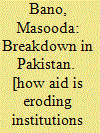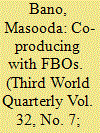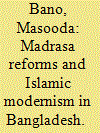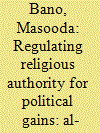|
|
|
Sort Order |
|
|
|
Items / Page
|
|
|
|
|
|
|
| Srl | Item |
| 1 |
ID:
112971


|
|
|
|
|
| Publication |
Stanford, Stanford University Press, 2012.
|
| Description |
xiii, 220p.Hbk
|
| Standard Number |
9780804781329
|
|
|
|
|
|
|
|
|
|
|
|
Copies: C:1/I:0,R:0,Q:0
Circulation
| Accession# | Call# | Current Location | Status | Policy | Location |
| 056591 | 361.7095491/BAN 056591 | Main | On Shelf | General | |
|
|
|
|
| 2 |
ID:
106676


|
|
|
|
|
| Publication |
2011.
|
| Summary/Abstract |
Forging partnerships for development is one of the eight Millennium Development Goals. While faith-based organisations (fbos) are receiving growing attention within development policy as important non-state service providers, they are assumed to be less conducive to forging partnerships with governments or development organisations than secular ngos due to their allegiance to specific religious beliefs. Analysing the dynamic of engagement between the state and madrasas (the most prominent fbo in the Muslim world) in six countries across two geographical regions-the Middle East (Egypt, Syria, Turkey), and South Asia (Pakistan, India, Bangladesh)- the paper counters the assumption that fbos are less likely to enter into negotiations, demonstrate flexibility, and engage in the strategic bargaining often involved in forging such partnerships. Like ngos, fbos respond to socio-political and economic incentives and enter into a variety of relationships with the state, ranging from co-operation to conflict. The defining feature in building a cooperative relationship is the level of trust between the negotiators on the two sides.
|
|
|
|
|
|
|
|
|
|
|
|
|
|
|
|
| 3 |
ID:
132963


|
|
|
|
|
| Publication |
2014.
|
| Summary/Abstract |
The old project of modernizing madrasas has acquired a new zeal in South Asia after September 2011, whereby madrasa reform programmes became an acknowledged soft tactic of the war on terror. With 9000 Aliya (reformed) madrasas, the Bangladesh madrasa modernization programme has been identified as a potentially useful model for the neighbouring states of Pakistan and India who have made slower progress in implementing similar programmes. In this paper I argue that, although the Aliya madrasa system in Bangladesh has succeeded in integrating secular subjects in the madrasa curriculum, in reality this modernization project has failed in its underlying ambition to generate a 'modern discourse' on Islam-a discourse that is compatible with the demands of western modernity. The right to speak for Islam is still primarily exercised by the 'ulama and graduates of the Qoumi (unreformed) madrasas. Aliya madrasas today compete with the secular schools not with Qoumi madrasas. The growth of the Aliya madrasa system in Bangladesh, instead of bearing testimony to the popular appeal of the modernization agenda, demonstrates the preference of Muslim parents for increased Islamic content in the school curriculum
|
|
|
|
|
|
|
|
|
|
|
|
|
|
|
|
| 4 |
ID:
163058


|
|
|
|
|
| Summary/Abstract |
The shedding of blood is a serious matter in Islamic law; disregard for human life negates the very essence of just rule. By standing by General al-Sisi as he suppressed the Muslim Brotherhood, the popular legitimacy of al-Azhar – the oldest seat of Islamic learning – was called into question. This article shows how the al-Sisi government skilfully deployed the two other state-controlled religious establishments, the Ministry of Awqaf (Religious Endowments) and Dar-ul-Ifta, to boost al-Azhar’s popular legitimacy in this context. Existing scholarship highlights the importance of competition within the Egyptian religious sphere to explain how the Egyptian state co-opts the al-Azhari official establishment. This article instead shows how the state, equally skilfully, uses state institutions to boost al-Azhar’s popular legitimacy – albeit to ensure that it remains useful for the purposes of political legitimisation. Political authority and religious authority in Egypt thus remain closely entangled.
|
|
|
|
|
|
|
|
|
|
|
|
|
|
|
|
| 5 |
ID:
163882


|
|
|
|
|
| Summary/Abstract |
Routinely required to lend religious legitimacy to contentious state policies, al-Azhar's moral authority has been under pressure since its nationalization in 1961. This article outlines how Shaykh al-Azhar Ahmad al-Tayyib's recent alliance with President ʿAbd al-Fattah al-Sisi has, however, exposed al-Azhar's moral authority to unprecedented risks. This is for three reasons. First, the tactics used by al-Sisi's government to quell the Muslim Brotherhood have been more extreme than those used by previous regimes. Second, the al-Azhari establishment's defence of these violent tactics has been more unqualified than in the past. Third, current state-led reforms of al-Azhar's curriculum are more controversial than prior efforts along these lines. As I show, these recent developments are not a complete break from the past; rather, they are a natural outcome of incremental shifts that have been occurring within al-Azhar since its nationalization over fifty years ago.
|
|
|
|
|
|
|
|
|
|
|
|
|
|
|
|
|
|
|
|
|